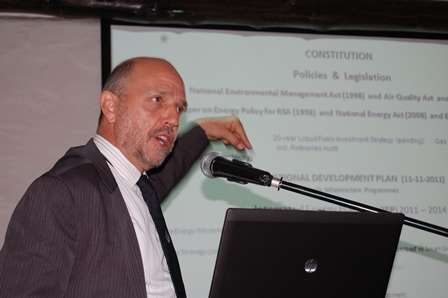The tyranny of realism in energy planning

A report exploring the political economy of energy planning under democracy and the Integrated Energy Planning (IEP) process due to conclude this year was launched by the British High Commission, Project 90 by 2030, and the Exxaro Chair in Global Change and Sustainability Research at Wits University on Friday, 15 August.
Titled: "The Tyranny of Realism: Integrated Energy Planning (IEP) in South Africa in 2014," the publication explores some of the stratagems and dynamics at play in the contestation of our energy development pathway. It seeks to present a coherent perspective, and to stimulate and inform broad participation in South Africa's second national IEP process currently in progress.
The launch of the publication concludes a short project undertaken by Project 90 by 2030 and funded by the British High Commission, and is written by South African energy policy researcher and activist, Richard Worthington.
"If one looks at the most likely consequences of the energy development pathways being treated as 'realistic' (for the world and for South Africa, by a majority of mainstream agencies), such realism is literally conceding defeat, in the face of drastic disruption to our life-support system and the biosphere of which we are an integral part," says Worthington.
"The greatest flaw in so much energy planning and analysis is that we are not actually looking at and trying to understand the full extent of what is necessary. With so many interested parties and experts proclaiming what is not realistic, we have not – at least not yet – tried to develop a coherent vision of a just transition to sustainable energy."
Worthington highlights the fact that government has recently committed, in principle, to another public workshop on IEP to present analysis that will feed into multi-criteria decision-making.
Professor Barend Erasmus, Director of the Global Change and Sustainability Research Institute at Wits University, says: "If we do develop very good technical solutions to the energy crisis, we are still unlikely to deliver an effective solution if there is no socio-political buy-in into the IEP process."
British High Commissioner, Judith Macgregor, says stakeholder engagement and frank contestation amongst interest groups are vital to robust development planning and democratic processes to realise the best intentions of policy.
"The UK government is pleased to support not only the work of the South African government, but also civil society participation, including critique that is challenging and interrogates the boundaries of practicality. Dr Steve Lennon of Eskom, when discussing the fundamental change facing the power sector driven by the emergence of renewable and low resource intensity supply and demand technologies, concluded in an article last month: 'We just need to have more confidence in our ability to do it!'"
The event also saw the introduction of the 2050 Pathways Calculator project, with the aim of gathering input towards the elaboration of this educational tool. The 2050 Pathways Calculator has been developed by the Department of Environmental Affairs in partnership with the UK Department of Energy and Climate Change, and models potential allocations of a national carbon budget. It is available as a download and a web version is available here.
More information: The complete report is available online: www.90x2030.org.za/oid/downloads/PROJECT%2090_IEP%20Report_14Aug2014_FinalWebPDF_SinglePages.pdf
Provided by Wits University



















